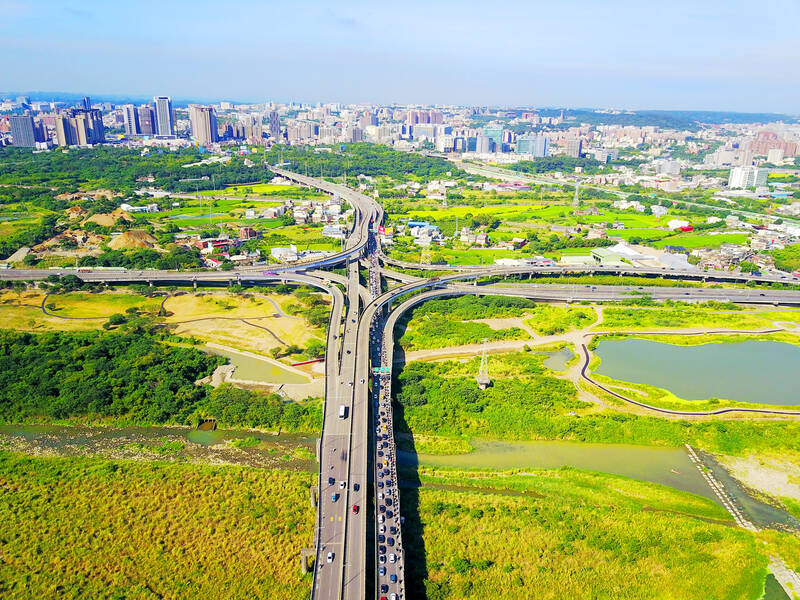Jhubei City in Hsinchu County recorded the nation’s highest growth in absolute population over the past five years, while the highest rate of growth by percentage occurred in Lienchiang County’s Beigan Township (北竿), according to statistics released last week by the Ministry of the Interior.
Jhubei, near the Hsinchu Science Park, saw its population expand by 19,085 people from 2018 through the third quarter of last year. New Taipei City’s Linkou (林口) and Tamsui (淡水) districts were in second and third place, the data showed.
The statistics cover 20 localities that had the largest population increases, including county-administered cities, districts and townships.

Photo courtesy of the Hsinchu County Government
The populations of New Taipei City’s Linkou and Tamsui districts increased by 17,160 and 15,901 respectively. Taichung’s Beitun District (北屯) registered 14,565 new residents.
Several districts in Taoyuan were next-highest in their increases. Taoyuan (桃園) and Jhongli (中壢) districts saw their populations increase by 12,234 and 10,449 respectively, while Gueishan (龜山) went up by 8,651 people, and Bade (八德) 7,882.
Rounding out the top 10 are New Taipei City’s Sijhih District (汐止) with 7,347 new residents, and Kaohsiung’s Renwu District (仁武) with 7,106.
From the remainder of the localities, all but one — Hsinchu County’s Hukou Township (湖口), north of Jhubei — are in Taiwan’s six special municipalities, where nearly 70 percent of Taiwan’s population resides.
City officials in New Taipei City and Taoyuan cited lower housing prices, good public transportation, and access to jobs and recreation as factors driving population growth, particularly among younger people.
Jhubei Mayor Cheng Chao-fang (鄭朝方) said that Hsinchu city and county form a common metropolitan area, whose several science and technology parks have attracted major companies offering large numbers of well-paying jobs.
The ministry also published statistics on the rate of population growth, showing that Lienchiang’s Beigan Township, with a population of about 3,000, grew the most in terms of percentage per quarter.
Beigan Township recorded an average population increase of 1.53 percent per quarter over the five-year period.
Rounding out the top five were Linkou at 0.85 percent per quarter, Taoyuan’s Fusing District (復興) at 0.63 percent, Hualien’s Fengbin Township (豐濱) with 0.6 percent and Jhubei with 0.58 percent.
Locations with the largest rate of population decline were all in Taipei. The capital city’s Xinyi (信義), Songshan (松山), Zhongshan (中山), Daan (大安) and Wanhua (萬華) districts all registered decreases of more than 0.5 percent per quarter during the five-year period, the data showed.
Taipei’s population loss was one of the main topics of debate in November’s Taipei mayoral election, with candidates discussing high housing prices and low wages as factors driving young families away from the capital.
Former Taipei deputy mayor Vivian Huang (黃珊珊) said that Taipei’s population decline should be understood in the context of a nationwide population decline since 2020.
All of Taiwan’s six special municipalities, except for Taoyuan, have registered population declines, and many Taipei residents have chosen to move to New Taipei City or Taoyuan because of their convenient transportation links to Taipei, Huang said during the recent election campaign.
Hualien Civil Affairs Department Deputy Director Lee Wei (李葳) downplayed Fengbin Township’s population growth rate, saying that the rural township has only 4,300 residents and the increase is “no big deal.”
“The denominator is low, so if a few people move in, the growth rate is very large,” Lee said.

Taiwan has received more than US$70 million in royalties as of the end of last year from developing the F-16V jet as countries worldwide purchase or upgrade to this popular model, government and military officials said on Saturday. Taiwan funded the development of the F-16V jet and ended up the sole investor as other countries withdrew from the program. Now the F-16V is increasingly popular and countries must pay Taiwan a percentage in royalties when they purchase new F-16V aircraft or upgrade older F-16 models. The next five years are expected to be the peak for these royalties, with Taiwan potentially earning

STAY IN YOUR LANE: As the US and Israel attack Iran, the ministry has warned China not to overstep by including Taiwanese citizens in its evacuation orders The Ministry of Foreign Affairs (MOFA) yesterday rebuked a statement by China’s embassy in Israel that it would evacuate Taiwanese holders of Chinese travel documents from Israel amid the latter’s escalating conflict with Iran. Tensions have risen across the Middle East in the wake of US and Israeli airstrikes on Iran beginning Saturday. China subsequently issued an evacuation notice for its citizens. In a news release, the Chinese embassy in Israel said holders of “Taiwan compatriot permits (台胞證)” issued to Taiwanese nationals by Chinese authorities for travel to China — could register for evacuation to Egypt. In Taipei, the ministry yesterday said Taiwan

Taiwan is awaiting official notification from the US regarding the status of the Agreement on Reciprocal Trade (ART) after the US Supreme Court ruled US President Donald Trump's global tariffs unconstitutional. Speaking to reporters before a legislative hearing today, Premier Cho Jung-tai (卓榮泰) said that Taiwan's negotiation team remains focused on ensuring that the bilateral trade deal remains intact despite the legal challenge to Trump's tariff policy. "The US has pledged to notify its trade partners once the subsequent administrative and legal processes are finalized, and that certainly includes Taiwan," Cho said when asked about opposition parties’ doubts that the ART was

If China chose to invade Taiwan tomorrow, it would only have to sever three undersea fiber-optic cable clusters to cause a data blackout, Jason Hsu (許毓仁), a senior fellow at the Hudson Institute and former Chinese Nationalist Party (KMT) legislator, told a US security panel yesterday. In a Taiwan contingency, cable disruption would be one of the earliest preinvasion actions and the signal that escalation had begun, he said, adding that Taiwan’s current cable repair capabilities are insufficient. The US-China Economic and Security Review Commission (USCC) yesterday held a hearing on US-China Competition Under the Sea, with Hsu speaking on